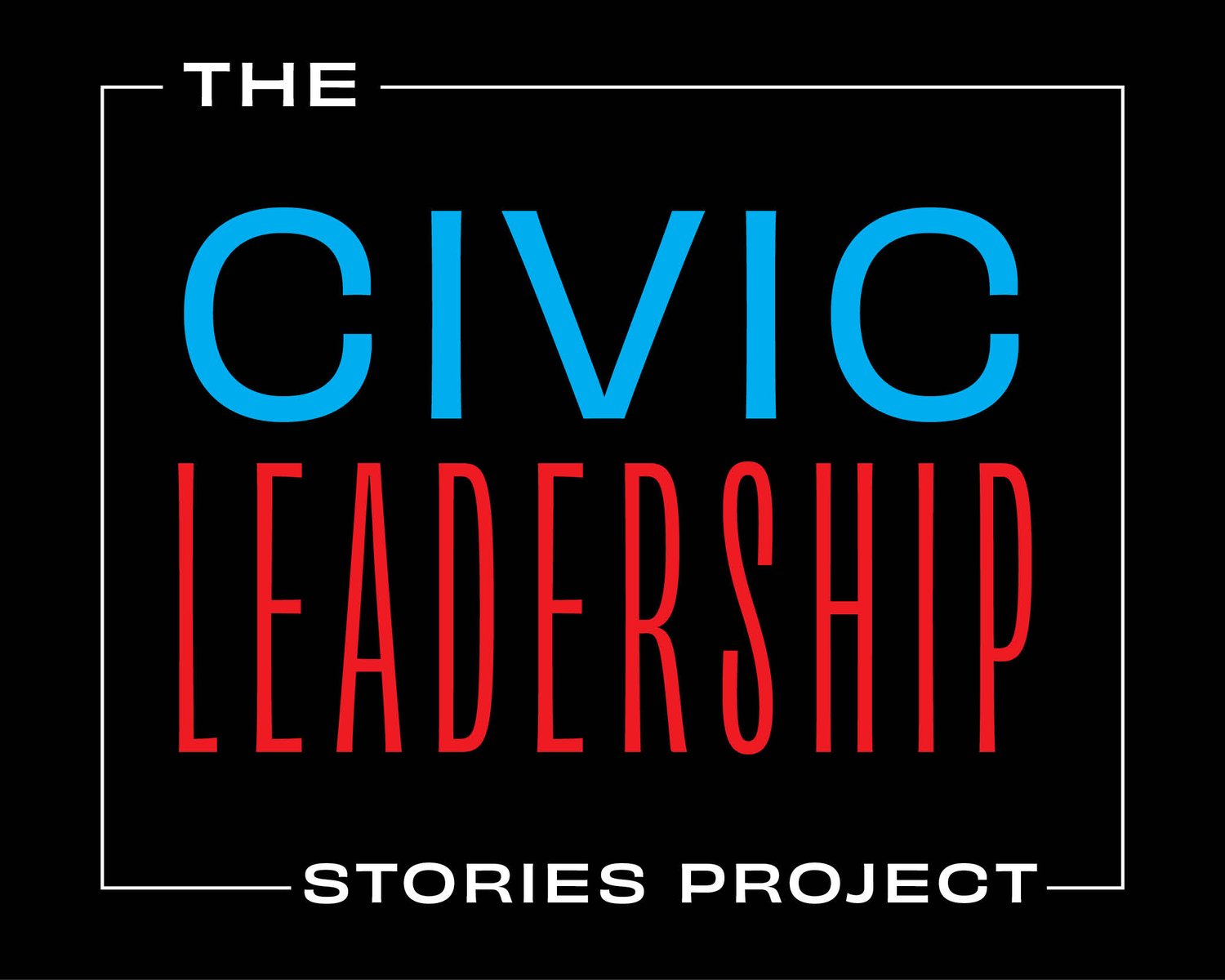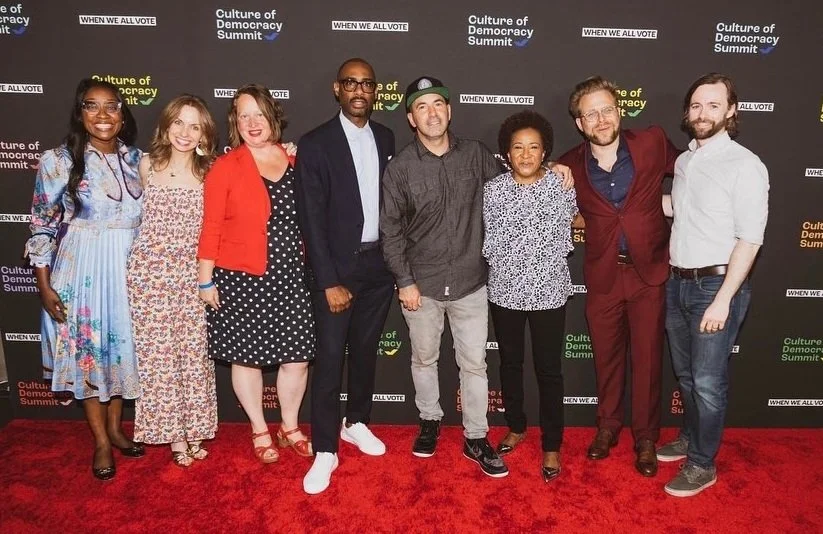New Civic Storylines Study Released with MTV, and When We All Vote
Study reveals opportunities for popular entertainment to increase depictions of civic leadership and citizen engagement
June 13, 2022
Los Angeles, CA—Today’s most-watched entertainment TV programs among 18-34-year-olds depict civic themes one-third of the time, but they are more likely to show conversations than actions like voting and passing legislation, according to a new study released today by researchers at the Center for Media & Social Impact (CMSI) at American University, in partnership with MTV Entertainment Studios and Michelle Obama’s When We All Vote.
As part of CMSI’s Civic Leadership Storytelling Project, the study – Watching Out for Democracy: How Entertainment TV Portrays Civic Leadership and Civic Engagement in the U.S. – is the first to examine how voting, civic engagement, and civic leadership are shown in the top scripted and unscripted entertainment programming in the United States during a time of increasing political polarization.
Presented by CMSI Executive Director and lead researcher Caty Borum at When We All Vote’s Culture of Democracy Summit today in Los Angeles, to be keynoted this afternoon by the organization’s founder and Co-Chair Michelle Obama, the study found that while TV show characters are often shown talking about contemporary civic and social issues like racism, mental health, and the environment, they are rarely shown taking leadership and acting to solve civic problems in their communities. The findings present opportunities for entertainment TV to show models of authentic and effective civic leadership and civic participation in storylines that portray characters grappling with—and solving—contemporary dilemmas and problems in fresh, compelling storylines.
After the research presentation and spotlight talk at the Summit by Caty Borum, industry leaders including Wanda Sykes, Emmy-winning writer, comedian, actor, producer; Adam Conover, Comedian and Host of Higher Ground’s “The G Word” on Netflix; Charles D. King, Founder & CEO of MACRO; and Scott Budnick, Film producer, Founder of the Anti-Recidivism Coalition (ARC), and CEO of One Community, LLC, discussed how the entertainment industry can create more impactful and balanced depictions of civic engagement to promote a healthier democracy.
Key study findings:
● Civic Themes Appear in Nearly One-Third of Episodes, But Authentic Portrayals of Civic Leadership Are Lacking: Civic themes—appearance of civic conversations, ideas and actions—appear in about one-third (29%) of top-rated entertainment TV program episodes, across both scripted and unscripted genres. Scripted drama and sit-coms portray civic themes more than all other entertainment TV genres (47% of civic themes occur in scripted drama, versus 1-18% in all other genres, with scripted comedy in the number-two spot, portraying 18% of the civic themes in this listing of TV programs).
● Civic Conversation Is Portrayed Nearly Three Times More Than Civic Action: On-screen characters in top-rated entertainment TV programs are much more likely to be seen talking about civic and social issues than taking action—in fact, they are nearly three times more likely to be in conversation about contemporary social and civic issues than engaging in behaviors about them. Politicians, candidates for elected office, and civil servants tend to give public talks or attend public events, and are the least likely to be shown engaging in the legislative and public policymaking process itself.
● Law Enforcement Dominates Portrayals of Civic Leadership: Elected officials, political candidates for elected office, and non-elected government officials/civil servants are portrayed far less than other civic professionals. Elected officials show up in 11% of episodes, civil servants/non-elected government officials show up in 8%, and political candidates show up in 2% of episodes. By contrast, law enforcement and criminal justice system professionals appear in four in ten (41%) episodes, while teachers appear in 13% of episodes. Law enforcement portrayals appear nearly four times more than elected public leaders, and five times more than civil servants.
● Official Corruption is Twice as Common as Policymaking: Elected officials, political candidates for elected office, and non-elected government officials and civil servants are twice as likely to be shown engaging in illegal activities than working in policymaking.
● White Men Dominate Civic Leadership Portrayals: When elected officials, political candidates for elected office, and non-elected government officials and civil servants are portrayed in entertainment TV, they are much more likely to be White (78% White, 23% Black, Indigenous, and people of color) and male-identifying (68% men, 32% women).
● Everyday People Engage on Social Issues But Infrequently Take Action: Most-watched entertainment TV show characters generally do not engage with politics in storylines, but instead with contemporary social issues. Although infrequent, the top-five civic activities in which everyday people engage are: (1) organizing or attending events or giving talks/speeches on issues of public concern or public policy (6%), (2) donating or volunteering to address issues of public concern or community needs (nearly 6%), (3) boycotting a product or service or engaging in public protests or demonstrations (a little over 3%), (4) participating in nonpartisan get-out-the-vote activities or working the polls (nearly 3%), and (5) organizing/attending events or giving talks/speeches (2%).
● Topical Conversations Reflect Contemporary Public Debate: When they do discuss civic and social issues in entertainment TV episodes, characters are much more likely to discuss contemporary social issues than electoral politics or public institutions. Topical social issues in conversation reflect crucial and timely social justice topics in American life, with a focus on racial justice and racism, immigration, and gender violence.
● Voting Behaviors Are Rarely Portrayed: Entertainment TV characters engage in voting behaviors (both registration and voting) in less than 1% of top-rated entertainment TV programming; only five total characters (across 658 TV episodes) are shown registering to vote or voting.
“We have known for many decades that what we see on entertainment TV matters a great deal in shaping the world we want to live in,” said Caty Borum, the study’s principal investigator and Executive Director of CMSI. “Entertainment media has incredible cultural power to show us participating positively in making our democracy work, through our own actions and our demands of public officials who work for us, and this study is one piece of helping us understand what we see and learn from pop culture.”
“As storytellers, we understand the power of content and our platform to move society forward – culturally and politically – through representation, from mental health to civic action,” said Brianna Cayo Cotter, SVP of Social Impact at Paramount Global’s MTV Entertainment Studios. “We’re thrilled to partner with the Center for Media & Social Impact on this important and illuminating study that underscores entertainment’s role in encouraging democratic engagement.”
“When We All Vote is proud to release this research at our inaugural Culture of Democracy Summit because we are bringing together leaders in every industry to show how they all play a major role in shaping our democracy -- from the values we share and the communities we build to the music we dance to and the content we consume,” said Stephanie L. Young, Executive Director of When We All Vote. “Our hope is that more leaders in the entertainment industry will use their power to show the significance of authentic civic participation and public service, and partner with When We All Vote to shift the culture around voting in this country.”
“We’ve all seen the character tropes of politics and government, but there are so many other unexpected and entertaining storylines about civic leaders waiting to be told,” said Will Jenkins, Director of the Center for Media & Social Impact’s Civic Leadership Stories Project. “That’s why we’re helping connect scriptwriters and other creatives with the untold stories of civic leaders all over the country who are breaking barriers, challenging injustice, and building healthy, inclusive communities.”
The study sheds broader light on entertainment TV storylines in that no one genre is better able to incorporate civic life and participation than another, from reality to scripted drama to comedy. In addition to portraying public leaders and citizens actively engaged in building and improving their communities, showrunners and creatives can incorporate into the dialogue of on-screen characters more civic conversations that mirror popular culture and topics of greatest concern among U.S. entertainment TV viewers.
To access the full study, visit https://cmsimpact.org/report/watching-out-for-democracy/.
# # #
The Center for Media & Social Impact (CMSI), based at American University's School of Communication in Washington, D.C., is a creative innovation lab and research center that creates, studies, and showcases media for equity, social change, and social justice. Focusing on independent, documentary, and entertainment media, the Center bridges boundaries between scholars, producers and communication practitioners across media industries, social justice, public policy, and public engagement. The Center produces resources for the field and academic research; creates original media; convenes conferences and events; and works collaboratively to understand and design media that matter. https://cmsimpact.org
MTV Entertainment Group is one of the preeminent youth media companies in the world that connects with global audiences through its nine iconic brands – MTV, Comedy Central, VH1, CMT, Pop, Logo, Smithsonian, Paramount Network and TV Land – as well as MTV Books and MTV Entertainment Studios which produces acclaimed series and movies and the award-winning, Oscar nominated MTV Documentary Films. MTVE also uses its reach for social impact, spearheading broad change-driven coalitions through mental health and civic engagement campaigns.
When We All Vote, an initiative of Civic Nation, is a leading national, nonpartisan initiative on a mission to change the culture around voting and to increase participation in each and every election by helping to close the race and age gap. Created by Michelle Obama, When We All Vote brings together individuals, institutions, brands, and organizations to register new voters across the country and advance civic education for the entire family and voters of every age to build an informed and engaged electorate for today and generations to come. We empower our supporters and volunteers to take action through voting, advocating for their rights, and holding their elected officials accountable. In 2020, When We All Vote ran a robust, multifaceted campaign and reached more than 100 million people to educate them about the voting process and get them registered and ready to vote. The initiative also led in voter education, registration, and volunteer engagement and as a result, 512,000 people started or completed the voter registration process, and nearly 500 media, corporate, and nonprofit partners joined its efforts. Michelle Obama launched When We All Vote in 2018 and is joined by fellow Co-Chairs Tom Hanks, Lin-Manuel Miranda, Janelle Monáe, Chris Paul, Faith Hill, Selena Gomez, Liza Koshy, Megan Rapinoe, Shonda Rhimes, Tracee Ellis Ross, Kerry Washington, and Rita Wilson. When We All Vote is a key initiative within Civic Nation, a 501(c)(3) organization, and works with Civic Nation Action, a 501(c)(4). These organizations are homes for changemakers who inspire, educate, and activate people around the issues that will define this generation. https://whenweallvote.org/
The Civic Leadership Stories Project, an initiative of the Center for Media & Social Impact, in partnership with Cinereach, supports scriptwriters, showrunners, producers, talent, and other creatives telling storylines about people who are shaking up how things are done in places of power. These storylines (which are not just in “political” shows) can inspire audiences to get involved with voting, advocacy, and public service. The Project offers script consulting, story and character libraries, workshops, and more. https://www.civicleadershipstories.com

